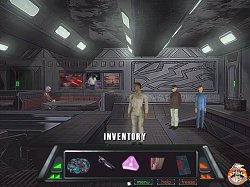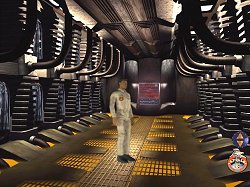|
The Ward
 Most science fiction computer games tend to have you clanking around generally sterile, colourless, metallic environments such as a space station or a moon base and The Ward is no exception. This is a game that science fiction fans should find very familiar with lots of metallic passageways lined with doors that swish open and shut leading to rooms full of strange machinery and banks of blinking monitors. Although I sometimes find such settings to be a bit too lifeless, after a few minutes of exploration and a brief introduction to the sort of puzzles it looked like I was about to encounter, I was ready to settle in and have fun with The Ward. I remember turning to Rosemary and saying, "I think I am going to enjoy this one."
And for the first third of the game I did enjoy it despite an annoying timed sequence. It had some interesting inventory based puzzles, some killer robots to outsmart and some fascinating equipment to manipulate; and it made me think about where the story was heading. The next two sections, I felt, let the game down which was a major disappointment after such a promising beginning ... but I will have more to say on this later. Most science fiction computer games tend to have you clanking around generally sterile, colourless, metallic environments such as a space station or a moon base and The Ward is no exception. This is a game that science fiction fans should find very familiar with lots of metallic passageways lined with doors that swish open and shut leading to rooms full of strange machinery and banks of blinking monitors. Although I sometimes find such settings to be a bit too lifeless, after a few minutes of exploration and a brief introduction to the sort of puzzles it looked like I was about to encounter, I was ready to settle in and have fun with The Ward. I remember turning to Rosemary and saying, "I think I am going to enjoy this one."
And for the first third of the game I did enjoy it despite an annoying timed sequence. It had some interesting inventory based puzzles, some killer robots to outsmart and some fascinating equipment to manipulate; and it made me think about where the story was heading. The next two sections, I felt, let the game down which was a major disappointment after such a promising beginning ... but I will have more to say on this later.
The introduction sets the scene for the story where your character, David Walker, is an astronaut on the Moon with the Apollo XIX mission. An alien spacecraft appears, your comrades are killed and you wake up on said moon base with some sort of war going on around you and a necklace that prevents you from straying too far. Once you overcome this restriction you are able to explore your surroundings more fully, but you know you are not going to escape until you can understand and use the alien technology and avoid being killed in the process.
 The Ward is a third person perspective adventure game. It is definitely of the "old school" 2D, point and click variety, which I greatly appreciated although the single instance where you have to hold down the left mouse button instead of clicking caught me completely by surprise and held up proceedings for far too long. However, apart from this the interface is very simple with easy inventory access and with all inventory items clearly labelled. Most cut sequences have voice-overs as well as text, but there are no voices during gameplay because The Ward was developed by a small team rather than by a huge commercial company. Although this may bother some players I didn't mind at all as I usually play with text enabled anyway and frequently click through conversations as I read them. The Ward is a third person perspective adventure game. It is definitely of the "old school" 2D, point and click variety, which I greatly appreciated although the single instance where you have to hold down the left mouse button instead of clicking caught me completely by surprise and held up proceedings for far too long. However, apart from this the interface is very simple with easy inventory access and with all inventory items clearly labelled. Most cut sequences have voice-overs as well as text, but there are no voices during gameplay because The Ward was developed by a small team rather than by a huge commercial company. Although this may bother some players I didn't mind at all as I usually play with text enabled anyway and frequently click through conversations as I read them.
On the downside, Walker (and later another character that you control) move very slowly and it would have been nice to speed them up or 'jump' them to exits. The slowness of Walker's movement is highlighted during the supposedly 'dramatic' timed sequences when the utmost urgency is called for. Unfortunately Walker is oblivious of the precious seconds counting down in the top left hand corner of the screen as he saunters along with no change of pace. The problem, of course, is not so much with Walker's walking speed but with the fact of timed sequences in an adventure game. And I am not just talking one or two, but there are several and not all alert you by the clock ticking down. Sometimes you will die unexpectedly because time has run out and you only know you were in a timed sequence because you died unexpectedly. This presents serious problems because you may have been in the sequence for a while and there is no clear way of determining when the timing started and at which point you should restore to repair the damage. Believe me, you will be saving and restoring continuously in this game ... fortunately there are plenty of save-game slots and there is also a useful quick-save feature.
This brings me to another problem. After the very good first section that has some complex and challenging puzzles the second part falls flat as you have to learn more of the story through continuous rounds of conversation. Apart from issues of pacing this is not necessarily a criticism, but at the same time the variety of things to do also dries up. Most of the puzzles in this middle portion involve finding clues to solve sliding tile puzzles. Now I never used to object to the occasional slider in an adventure game but The Ward has given me some empathy with those who do. Not only that, but there is a sliding tile puzzle in a timed sequence designed to double the jeopardy and (for many) the frustration. Fortunately, I had a useful ally in Rosemary who loves slider puzzles and she solved them all including the timed one in no time at all.
This second section never really rises to any great heights and the characters remain rather staged and wooden though they can move considerably faster than Walker. The unfolding story is about on a par with an episode of The X Files and the aliens or 'greys' as they are called look like they hopped straight off the slab at Roswell.
 The final part of the game seemed to hold out the promise of a return to the involving gameplay of the first section and it very nearly did so except that timed sequence followed timed sequence and I never felt that I could explore in peace as I dearly wanted to. The last timed sequence was so unforgiving that you couldn't afford a wrong move or you were dead. I like to play adventure games for relaxation and puzzle solving and by this stage my blood pressure was rising and I was getting more and more frustrated and the air was so blue with my language that I had to cover my ears. In the end, rapidly losing all interest in the story, I had to resort to a walkthrough just to finish it. Any fun I had early in the game was now just a memory.
So I must end by noting that The Ward is a game that may best appeal to science fiction fans who thrive on timed sequences and, to a lesser extent, sliding tile puzzles. Having said that, if you were to survey any group of adventure game fans you will find timed sequences and slider puzzles in their top five pet hates which makes me wonder if the developer, Fragile Bits, gave a lot of thought to who might be playing their game. Although I must point out here that there is an easy mode option available which allows you to skip the logic puzzles, but I could find no way to cancel the clock.
On the whole The Ward really didn't need to resort to timed sequences. The puzzles (yes, even the sliders) were interesting enough and some of them were very difficult - especially coming to grips with the gadgetry such as the 'memorizer' and working out exactly what you had to do. It's a shame that I can't be more positive about this game as I thought the first section was quite good and I was really prepared to enjoy the challenge and the exploration but too many frustrating timed sequences spoiled the experience. The final part of the game seemed to hold out the promise of a return to the involving gameplay of the first section and it very nearly did so except that timed sequence followed timed sequence and I never felt that I could explore in peace as I dearly wanted to. The last timed sequence was so unforgiving that you couldn't afford a wrong move or you were dead. I like to play adventure games for relaxation and puzzle solving and by this stage my blood pressure was rising and I was getting more and more frustrated and the air was so blue with my language that I had to cover my ears. In the end, rapidly losing all interest in the story, I had to resort to a walkthrough just to finish it. Any fun I had early in the game was now just a memory.
So I must end by noting that The Ward is a game that may best appeal to science fiction fans who thrive on timed sequences and, to a lesser extent, sliding tile puzzles. Having said that, if you were to survey any group of adventure game fans you will find timed sequences and slider puzzles in their top five pet hates which makes me wonder if the developer, Fragile Bits, gave a lot of thought to who might be playing their game. Although I must point out here that there is an easy mode option available which allows you to skip the logic puzzles, but I could find no way to cancel the clock.
On the whole The Ward really didn't need to resort to timed sequences. The puzzles (yes, even the sliders) were interesting enough and some of them were very difficult - especially coming to grips with the gadgetry such as the 'memorizer' and working out exactly what you had to do. It's a shame that I can't be more positive about this game as I thought the first section was quite good and I was really prepared to enjoy the challenge and the exploration but too many frustrating timed sequences spoiled the experience.
Copyright © Gordon Aplin 2001.
All rights reserved.
System Requirements:
PII 133 Mhz or higher, 32 MB RAM minimum, 130MB free hard drive space, 8xCD ROM.
|
